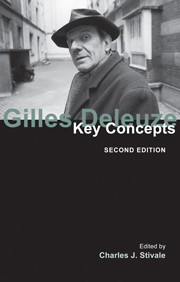Book contents
- Frontmatter
- Contents
- Contributors
- Acknowledgements
- Abbreviations
- Introduction: Gilles Deleuze, a life in friendship
- PART I PHILOSOPHIES
- PART II ENCOUNTERS
- 5 Sense, series
- 6 Event
- 7 Assemblage
- 8 Micropolitics
- 9 Becoming-woman
- 10 The minor
- 11 Style, stutter
- 12 The logic of sensation
- 13 Cinema
- Part III FOLDS
- Chronology
- Bibliography
- Index
10 - The minor
from PART II - ENCOUNTERS
- Frontmatter
- Contents
- Contributors
- Acknowledgements
- Abbreviations
- Introduction: Gilles Deleuze, a life in friendship
- PART I PHILOSOPHIES
- PART II ENCOUNTERS
- 5 Sense, series
- 6 Event
- 7 Assemblage
- 8 Micropolitics
- 9 Becoming-woman
- 10 The minor
- 11 Style, stutter
- 12 The logic of sensation
- 13 Cinema
- Part III FOLDS
- Chronology
- Bibliography
- Index
Summary
In a lengthy diary entry dated 25 December 1911, Kafka outlines the characteristics of small literary communities, such as those of East European Yiddish writers or the Czech authors of his native Prague (Kafka 1977: 191–5). In such minor literatures, Kafka observes, there are no towering figures, like Shakespeare in English or Goethe in German, who dominate the landscape and thereby discourage innovation or invite sycophantic emulation. Literary discussions are intense in a minor literature, political and personal issues interpenetrate, and the formation of a literary tradition is of direct concern to the people. In Kafka: Toward a Minor Literature, Deleuze and Guattari argue that Kafka's diary entry is less a sociological sketch of particular artistic milieus than a description of the ideal community within which he would like to write. Despite his adoption of German as his medium, they claim, Kafka's aspiration is to create within the major tradition of German letters a minor literature, one that experiments with language, ignores canonical models, fosters collective action and treats the personal as something immediately social and political. What Kafka's example ultimately discloses for Deleuze and Guattari is an approach to writing that may be extended to literature as a whole.
- Type
- Chapter
- Information
- Gilles DeleuzeKey Concepts, pp. 131 - 141Publisher: Acumen PublishingPrint publication year: 2011

